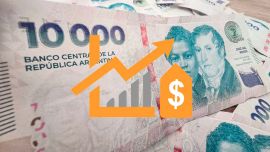Campaigning is entering the final stretch ahead of next weekend’s PASO primaries – and the level of tension and anxiety in the air is palpable.
Within the Alberto Fernández administration, aides are pushing a message of control and optimism, seeking to underline their confidence before voters head to the ballot box. That air of optimism, however, runs contrary to the challenges facing the ruling coalition – not only has Frente de Todos had to deal with a global pandemic and an economy that had already fallen off a cliff, it has had to deal with its internal power struggles, particularly between factions associated to Vice-President Cristina Fernández de Kirchner and those supporting the president.
The Peronist coalition has also been hit by a series of unforced errors, not least from Alberto Fernández himself, who is worrying party chiefs with his recent poll numbers. A series of surveys have indicated an erosion in the presidential image, reaching as high as 64 percent in the opposition stronghold of the City of Buenos Aires.
Across the aisle, Argentina’s opposition has sought to regroup with the intention of hitting hard in these midterm elections ahead of 2023, where they aspire to return to the Casa Rosada. City Mayor Horacio Rodríguez Larreta has managed to take the spotlight, dictating terms in the major battles, particularly the City and Province of Buenos Aires.
The aim for the newly rebranded Juntos is to continue their hegemony in the capital, from where they plan to launch a new bid for the presidency, and to potentially eat into the Frente de Todos’ power centre in the nation’s most populous region.
In both elections, Rodríguez Larreta’s top picks — María Eugenia Vidal in the City and Diego Santilli in the province —have been faced with internal adversaries. While Vidal is expected to easily win the election in the city, the rise of former economy minister Ricardo López Murphy within their same political space and his “tough” stance against the political establishment, has destabilised the mayor’s unified strategy. The real challenge, though, is in the Province, where neurosurgeon Facundo Manes through his hat in the ring with the support of the Radical Civic Union (UCR), which is part of the opposition coalition. Santilli is also expected to take the primaries by large margin, but his fight was supposed to be with Victoria Toloza Paz of the ruling Frente de Todos. Manes, though, is eyeing 2023, where he is looking to challenge Rodríguez Larreta’s leadership and presidential aspiration.
Most eyes next weekend will be on Buenos Aires Province and pollsters have been furiously quizzing residents in order to forecast their votes. One new poll issued Friday, carried out by the consulting firm Proyección last week, showed that Frente de Todos retained a four-point lead over Juntos por el Cambio in Buenos Aires Province.
The ruling coalition's slate, headed by Victoria Tolosa Paz, took 39.7 percent, outscoring the cumulative total of 35.1 percent for the two Juntos lists, one headed by Diego Santilli (21. 4 percent), the other by Facundo Manes (13.7 percent).
In Buenos Aires City, the opposition's stronghold, the two Juntos lists took 46.1 percent, compared to 30.7 percent for the Frente de Todos list topped by Leandro Santoro. Of the two Juntos lists in the federal capital, the one headed by ex-Buenos Aires Province governor María Eugenia Vidal was clearly favoured, taking 32.9 percent compared to the Republicanos Unidos-Juntos slate lead by Ricardo López Murphy.
Echoing a trend observed in most of the recent polls, the Proyección forecasts showed that rejection of President Alberto Fernández is growing. In the City, 64 percent of those surveyed said they would vote only to elect an opponent of the president.
Stocks jumping
Local stocks were also jumping this week amid growing speculation that the opposition Juntos por el Cambio coalition may put in a strong showing in November’s midterms.
Argentina’s benchmark equity index surged 16 percent this month in pesos, trailing only Mongolia among more than 90 stock gauges tracked by Bloomberg. Argentine shares have jumped 49 percent this year, among the world’s top five performers.
The S&P Merval index extended gains this month amid growing signs that Fernández’s Peronist coalition is losing ground. Last weekend, Corrientes Province Governor Gustavo Valdés won re-election, defeating his Peronist rival by more than 50 percentage points.
Some analysts, however, warned against jumping to conclusions.
Sunday’s result is a setback for the Casa Rosada but “it does not forecast anything regarding the [general] midterm” elections, said analyst Raúl Aragón. “Valdés won because he has managed well in Corrientes, but each province has its own dynamic.”
Investors believe that any of Argentina’s major opposition parties would fight against policies advocated by the current government, which has used foreign-exchange restrictions, price freezes, export bans and other unorthodox tactics to try to spark economic growth.
“Argentine shares are very cheap,” said Alberto Bernal, chief strategist at XP Investments in Miami. “If the government doesn’t do well in the midterm elections, the chances of a change in policy increases, and that drives prices.”
Political turmoil is also increasing in the weeks leading up to the elections to select half of the lower house and a third of the Senate. The so-called ‘Olivosgate’ scandal, which emerged after photos surfaced showing a crowded birthday party held for the first lady at the height of the pandemic lockdown in 2020 – has damaged the president’s image. A recent poll by local firm Synopsis found that Fernández’s negative image had increased to over 70 percent in August, from 63 percent in July.
– TIMES/BLOOMBERG/PERFIL





















Comments